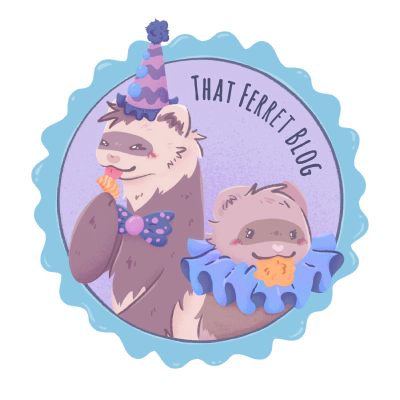

Enrichment & Toys
Ferrets, being naturally playful, outgoing, and intelligent, can easily get bored in their environments. Leading to depression or destructive behaviours. To prevent this, it’s crucial to provide a variety of enriching activities and toys in your ferrets’ space and regularly switch them out to keep things fresh and exciting. Ideally, you should alternate enrichment activities and toys every week to prevent boredom. This does not mean you constantly need to buy a surplus of toys (although it can be tempting). But instead, keep some toys aside and switch them out. Making their play area new, fun and exciting! ...
AGM 2024
We would love for the blog to serve as a space for sharing more personal stories, as well as providing information on ferret welfare. As members of a ferret welfare and rescue society, we often attend social events, shows, and gatherings. We thought - what better way to show our love for all things ferret than to share some of our show stories! There’s nothing like having fond memories to look back on! ...
Our Personal Experience Rescuing Ferrets
We have always been passionate about animal care and animals in general. This has led us to rescue A LOT of animals, from 21 Rats to a selection of reptiles & exotics. Rescuing animals has been a sometimes difficult - but rewarding experience. A few years ago we had someone reach out to us regarding a post on Facebook marketplace. A single ferret who was kept in poor conditions. Having rescued exotics before and being keen on owning ferrets we accepted and took in this sweet ferret. He was kept in a blank cage with only a chocolate tub full of water and a single plastic Hammock. No enrichment - not even a single blanket to snuggle in. We were eager to bring him home, and we named him Beezlebub (Bubs for short). ...
Why we Don't Feed Whole Prey
This post provides insight into whole prey feeding and why we don’t whole feed, which may benefit those considering different types of raw feeding. That’s not to say we disagree with whole prey feeding (I will outline some benefits as well). I am highlighting specific reasons we choose not to whole feed. What is whole prey feeding? In short, whole prey feeding is where you feed whole prey to your ferrets — quite literally. It’s the entire carcass — including all the fluff! ...
Why Ferrets Need Friends
Ferrets are highly social animals and thrive with companionship. This post will explore why ferrets need friends and the benefits of having more than 1 ferret. It will also address lone ferrets. Why ferrets need other ferrets It’s a common misconception that lone ferrets can ‘be fine’ on their own, exceptional circumstances notwithstanding. All ferrets should be able to have other ferret friends. It’s important to keep ferrets in at least pairs or more. ...
Ferret 101 Index
A quick index for all posts in the ‘Ferret 101’ series. This will help you navigate to posts quickly and find what you’re looking for. ฅ՞•ﻌ•՞ฅ♡ฅ՞•ﻌ•՞ฅ Potential Pros & Cons Of Owning Ferrets — A super simple post highlighting some basic pros and cons to owning ferrets. How Much Do Ferrets Cost? — A breakdown of the basic costs associated with owning ferrets. Initial Ferret Supplies Checklist — A basic bullet point checklist of initial ferret supplies. ...
Raw Feeding 101
This post will dive into raw feeding for ferrets. Raw 101 will be a series of posts on raw feeding (you can find all relevant posts on the series page). This is the main guide to all things raw and will include, kibble vs raw (condensed), ferret nutrition, types of diets and the amount of raw. Why raw and not kibble? Our blog will mainly discuss raw feeding as it is our preference, we have conducted much research on both raw feeding and kibble feeding to determine this. Raw food has many benefits for ferrets that kibble does not provide. These benefits include but are not limited to: ...
Basic Ferret Behaviours
Ferrets display a wide variety of behaviours. From pouncing and digging to the famous ‘weasel war dance’ this blog post will run through some of the most common ferret behaviours and why they do them! I have organised these behaviours into 8 separate categories. Playful Behaviours War dancing Also referred to as the ‘weasel war dance’. It’s a series of jumps, hops, twists and dooking which normally result in invitations to play, chase or capture a toy. Ferrets will war dance at you or other ferrets, it’s a sign they’re very excited! In the wild, ferrets war dance to confuse their prey or other predatory species. ...